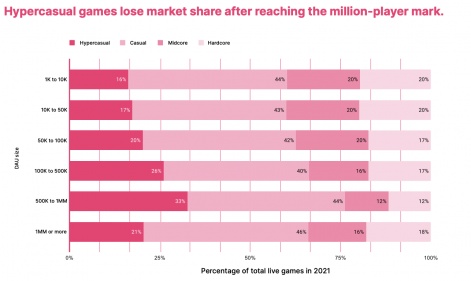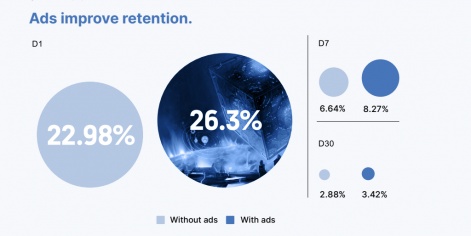Unity has released its Unity Gaming Report 2022 which takes a deep dive into the number of games created on the engine, as well as monetisation, engagement, and other key trends over the past year.
The past year has seen games created in Unity jump 93 per cent, with the biggest spike seen in hypercasual games, which have grown 137 per cent year-over-year.
The majority of hypercasual game revenues come from in-app ads, which Unity states makes up 94.09 per cent of overall revenues for the genre. The remaining revenue comes from in-app purchases. However, Unity has highlighted that hypercasual game in-app purchase revenues have increased by over 162 per cent over 2021.
The hypercasual industry has continued to grow at a rapid rate since it first began, with many pointing to Flappy Bird as the first hypercasual game. Recently, French hypercasual publisher Voodoo has surpassed six billion downloads worldwide across its portfolio, making it one of the leading mobile studios by download worldwide.
Despite the genre’s meteoric growth, Unity believes that the hypercasual sector has a "cap" on its audience size and that hypercasual titles lose market share after reaching the million player mark. Unity suggests that for games to maintain a larger, long-term audience, it requires "deeper" gameplay.

Multi-platform games are also on the rise, which Unity suggests will keep players within a game’s ecosystem as they will not switch to another game when they change devices.
Genshin Impact is a stellar example of this. Following its launch in September 2020, miHoYo’s latest cross-platform RPG generated over $2 billion across the App Store and Google Play within its first year.
Even video streaming platform Netflix has tried its hand with mobile games in a bid to keep more users within its ecosystem. The service currently sits at a humble 14 games, but is slowing growing with a further three games to come this month.
The ever-growing mobile games market
The report highlighted that with more people playing mobile games than ever before there has been a significant increase in revenue generated from ads: for example, stating mobile ad revenue in the Americas has grown over three times since January 2019. Additionally, there was also a substantial ad revenue increase experienced in the EMEA regions.
One method that Unity suggested to increase engagement amongst mobile gamers is through push notifications. Unity has stated that by sending targeted and segmented push notifications studios can boost their day 30 retention from 2.9 per cent to 3.8 per cent. Although the statistical increase may not seem significant, Unity describes even an increase of 0.5 per cent as a "big deal".
Unity has suggested in-game ads can also be attributed to improved retention, which counters the common misconception that ads drive players away. In fact, the firm has found games that include ads have higher retention rates across the board, with day seven retention rates at 8.27 per cent for games that include ads, compared with 6.64 per cent for games without ads.

Looking forward, Unity has made several predictions of how the games industry will evolve beyond 2022.
One prediction is that mobile multiplayer games, such as PUBG Mobile, will become the standard over the next decade. The firm expects this will happen as the presence of 5G networks grows and players begin to embrace more games that will be available from their mobile devices.






















